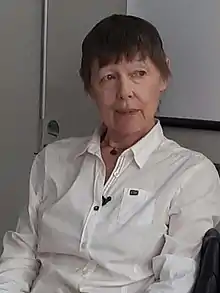Nonna Mayer
Nonna Mayer (born 25 March 1948) is a French political scientist.
Nonna Mayer | |
|---|---|
 Nonna Mayer in May 2019 | |
| Nationality | French |
| Alma mater | Institut d'études politiques |
| Scientific career | |
| Fields | |
| Institutions | |
Early life and education
Mayer was born on 25 March 1948[1] in Neuilly-sur-Seine.[2]
She graduated from the Political and Social Section of the Paris Institut d'études politiques in 1971,[3] and earned her doctorate in political science in 1983.[4] Her dissertation was called Les classes moyennes indépendantes dans la vie politique: le cas des petits commerçants français.[4]
Career
Mayer is Director of the French National Centre for Scientific Research, affiliated with the Centre de Recherches Politiques at Sciences Po (fr), and she runs the political sociology program of the Paris Institute of Political Studies. She has also directed the Master of Advanced Studies in Political Sociology and Public Policy and the Masters in Comparative Societies and Politics there. She and Edmond Préteceille (fr) manage the Societies in Motion section of the Sciences Po Press.
In September 2005, Mayer was elected President of the French Political Science Association (fr).[5]
Mayer has published numerous works on electoral politics. With Pascal Perrineau (fr), she co-directed a large group that studied the National Front. Her research focuses on electoral sociology, in particular that of the National Front and the French far right. She also studies associative activism, racism and anti-Semitism.[6]
Mayer also participates in the Racism and Xenophobia European Network, and in the Group Focused Enmity comparative survey led by Wilhelm Heitmeyer.[6] In February 2016, she was appointed member of the scientific council of the Inter-Ministerial Delegation to Combat Racism and Anti-Semitism, chaired by Dominique Schnapper.[7]
Mayer, together with Olivier Dard (fr), Alexandre Dézé, Nicolas Lebourg and Jean-Claude Monod (fr), consulted with President François Hollande about the possibility of a victory by Marine Le Pen in the presidential election of 2017.[8]
References
- "Who's Who in France". Retrieved 2 April 2020.
- Michel Abescat (20 December 2015). "Nonna Mayer : "Reprendre les thèmes du Front national est la pire solution"". Idées (in French).
- "Nonna Mayer" (in French). Sciences Po. Retrieved 2 April 2020.
- "Les classes moyennes indépendantes dans la vie politique" (in French). sudoc. Retrieved 2 April 2020.
- "The Challenge of Radical Right-Wing Populism in Europe: The French Case in Perspective". Princeton University. 29 November 2011. Retrieved 2 April 2020.
- "Voir encore sa fiche de chercheur au CEVIPOF" (in French). CEVIPOF. Archived from the original on 9 August 2007. Retrieved 2 April 2020.
- "Communiqué de presse: "Installation d'un Conseil scientifique auprès de la DILCRA"" (in French). Government of France. 9 February 2016. Retrieved 2 April 2020.
- Eric Aeschimann (2 March 2017). "Et si Marine Le Pen gagnait ? Hollande consulte" (in French). Retrieved 2 April 2020.